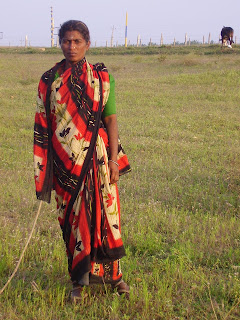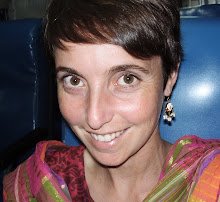
This week I returned to Ekalavyanagar, the village that was the site of our health camp last month. What we found was a broken roof, and a broken foot. Where there had once been at least marginal protection from the sun (if not the rain) over the preschool, there is now an entirely collapsed structure. PHRI had hoped to maybe help the village build a roof one day. But now, without much in the way of walls, or even toothpick-like poles, the task of providing a sturdy structure for preschool seems even more daunting.

And the broken foot is a red, swollen, painful, immobile ankle on a little boy alternately limping around with a stick and being carried by his grandmother. The story is a bit vague, but a month ago it was either stuck in a bicycle, smashed by a rock, or suffered some other calamity. Either way, it's healing remarkably poorly, can bear no weight, and hasn't been able to get this little boy to school.*

At the end of our visit we wandered towards the back of the village. What we discovered was a group of migrant workers even poorer than the rest. For baffling and bureaucratic reasons they haven't even been able to get ration cards, and there isn't enough to eat. Yet, the giggling, scrambling, half dressed kids were just as excited to have their pictures taken as any others.
*Owing to technical difficulties on the part of my aging computer, two weeks have elapsed between the writing and the posting of this entry. In the interim, my intrepid co-worker Sylvia, and the several grams of amoxicillin she brought back to the village after our visit, have gotten this little fellow back on his foot.





















